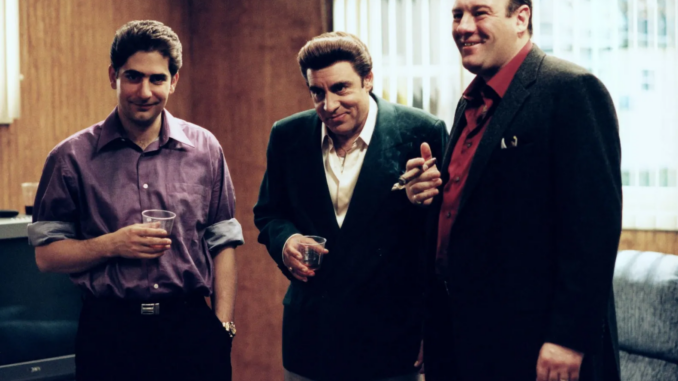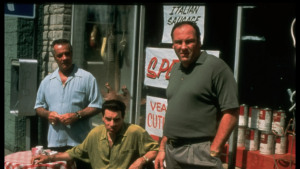
It only took an hour, on Feb. 7, 1999, for American television to change completely.
That day was the premiere of “College,” the fifth episode of HBO’s new drama “The Sopranos,” and the world will never be the same. Every antihero and embattled family, every dark-as-night comedy and humanized-monster serial that made television the preeminent art form of the 21st century, can trace its roots directly back to “College.” So too can many of the problems the TV revolution eventually unleashed.
For an hour, audiences watched open-mouthed as New Jersey mob boss Tony Soprano (James Gandolfini) took his spoiled but essentially sweet daughter, Meadow (Jamie-Lynn Sigler), on a college tour, only to glimpse, at a gas station, an FBI informant who put several of his friends in jail. What followed was a horrific yet often hilarious showcase of working-parent multitasking as Tony attempted to help his daughter sort out her future while, without her knowing, ending the informant’s.
Television’s definition of a leading man, the traditional limits of what stories the medium can tell and any notion of audience expectations went out the car window in “College,” making room for everything from “Breaking Bad” and “Dexter” to “True Blood ” and “Game of Thrones.”

It’s important to remember that when “The Sopranos” debuted on HBO just one month earlier, it was treated like any other TV show. Yes, it got almost universally good reviews — The Times’ then-critic Howard Rosenberg called it the “series of the season” — but in several of those reviews “The Sopranos” didn’t even get top billing. Rosenberg paired it with the long-forgotten NBC drama “Providence.” The late, great Washington Post critic Tom Shales took down the Fox comedy “The PJs” before endorsing “The Sopranos” as a “mob opera for people who think they’ve had quite enough of the mob.”
HBO was relatively new to the original scripted drama game — “Oz” had premiered only two years ago — and no one expected a platform called Home Box Office, which proudly declared “It’s not television, it’s HBO” to jump-start a revolution in a medium that was still considered lesser than film, never mind literature, theater or the fine arts.
Everyone was just excited that David Chase had breathed new life into the mob drama, in part by making his lead character so rattled by family worries and a career in New Jersey’s “waste management” that, after suffering a panic attack, he goes into therapy . (Something was definitely in the air that year: In March, Harold Ramis did the same thing at the actual box office with the comedy “Analyze This,” starring Billy Crystal and Robert De Niro, and was successful enough to spark a sequel, “ Analyze That.”)
